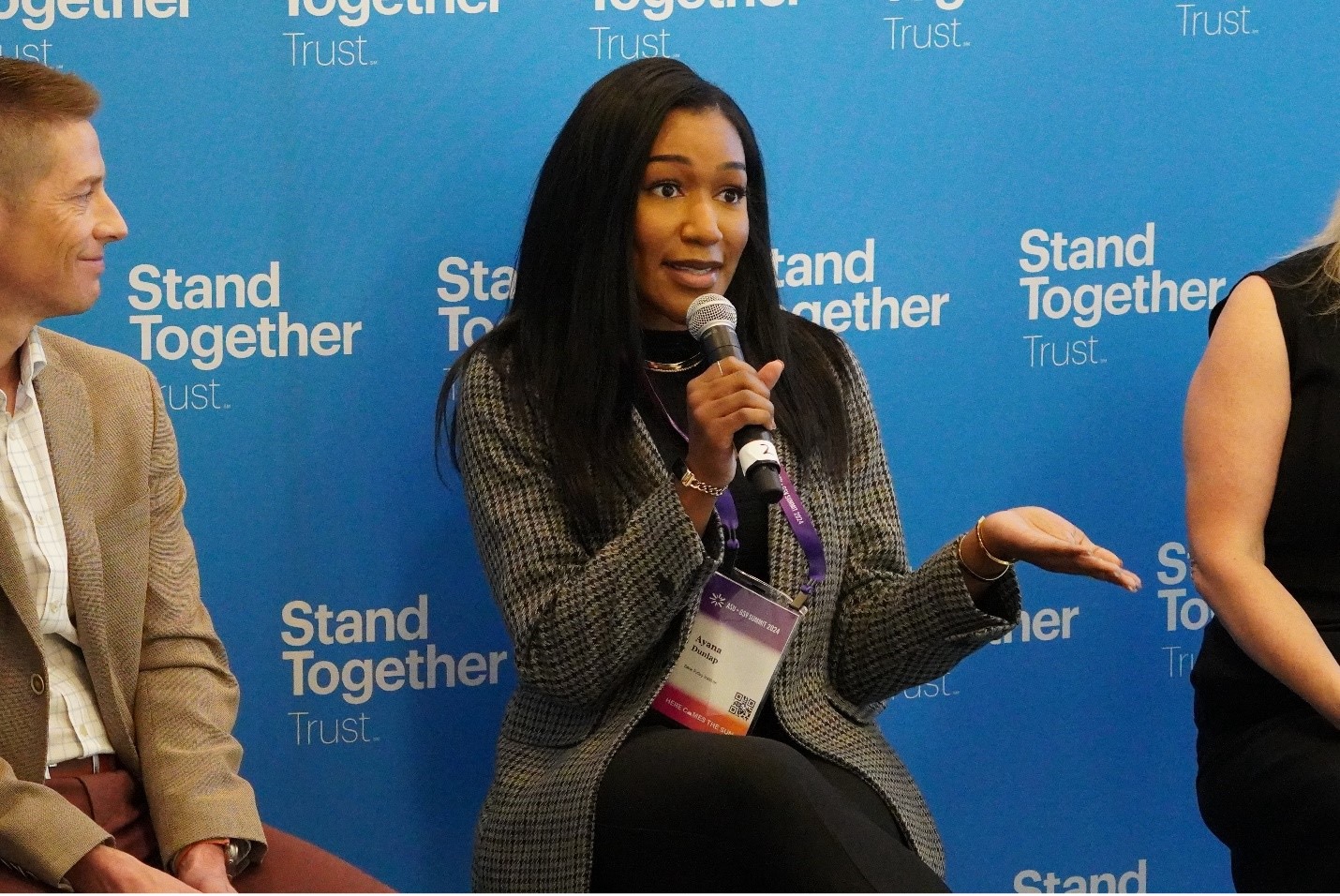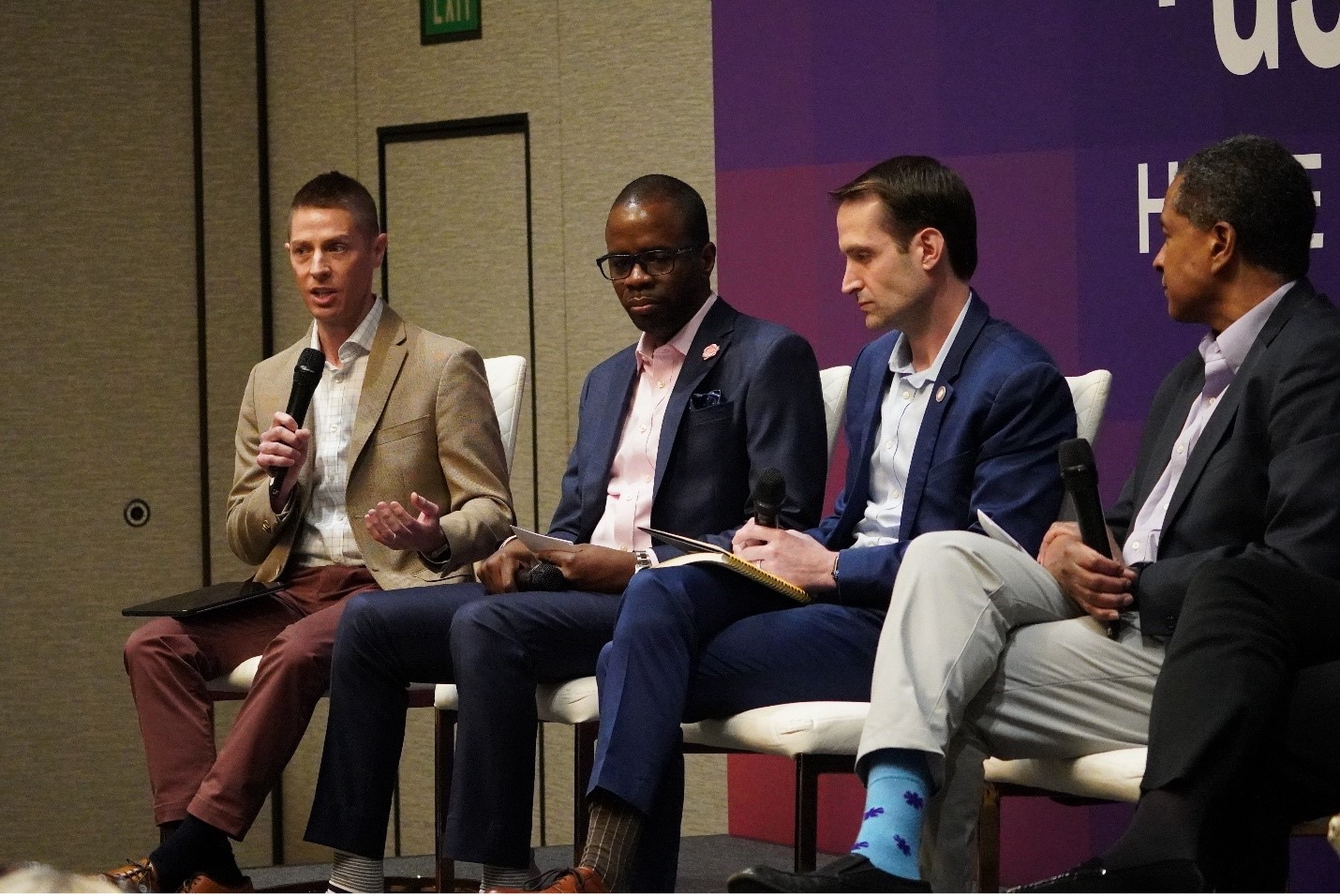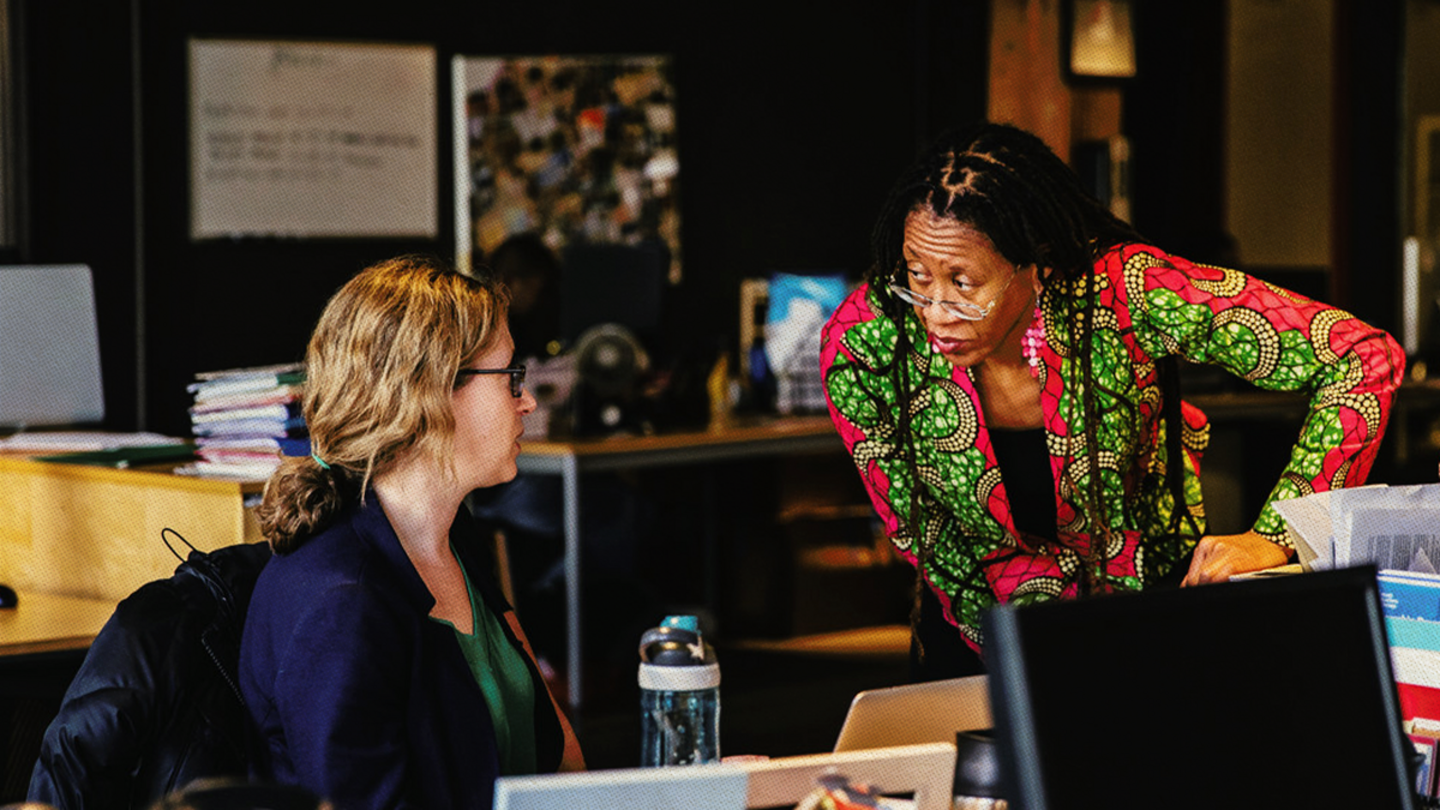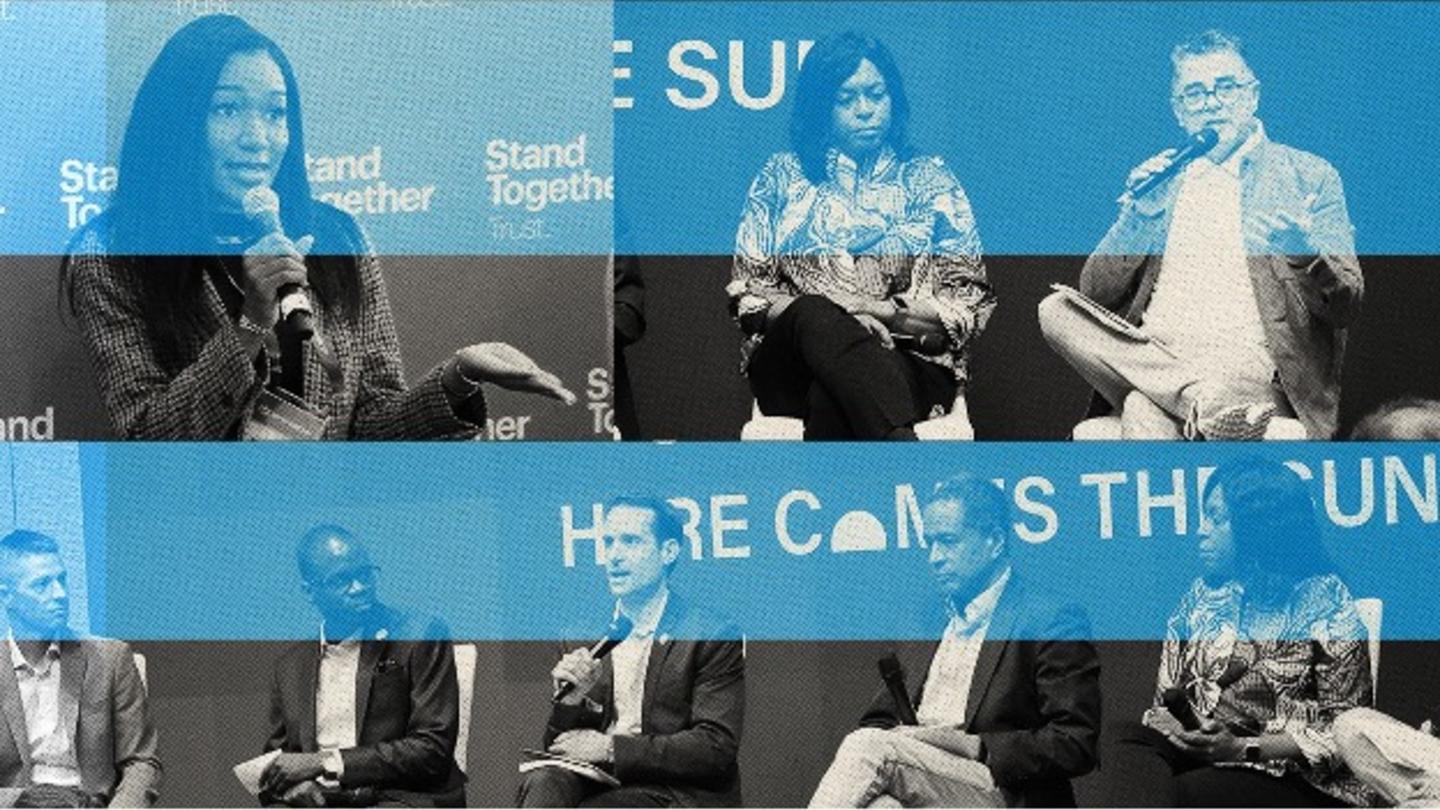In her early 20s, Ayana Dunlap landed what she thought was her dream job in the hospitality sector. Then COVID-19 hit.
With the world on lockdown and her industry disrupted, Dunlap needed to pivot — quickly. But how could she when a bachelor’s degree, which seemed necessary to break into high-demand tech jobs, would take years to complete?
A friend mentioned a tech training organization called Per Scholas, which provided the programs she needed to switch careers. Now, Dunlap earns a six-figure salary helping businesses in the financial services industry integrate technology into their platforms. She’d found her dream job – again.
Dunlap shared this story before a crowd at the recent ASU+GSV Summit in San Diego. This annual gathering brings leading educators, innovators, philanthropists, and policymakers to discuss innovations that will ensure people like Dunlap can find meaning through work and learning.
“So many students in the United States, especially those from families who are subsisting on lower incomes, have very limited pathways,” said Steve Taylor, Stand Together Trust director and senior fellow of Future of Work. “Essentially, they are forced after high school or as an adult learner into one pathway: an accredited college that offers a program.”
As a response, innovators and entrepreneurs across the country are leading a movement to find new and better pathways for learners to gain the skills to pursue work that leads to greater fulfillment — which produces a more engaged and productive workforce. When learners find a job where they see their work contributing to an organization’s mission, it's win-win because they are finally able to tap into their strengths, while businesses reap the benefits of more contribution-minded employees, which leads to lower turnover and higher productivity.
For leaders at ASU+GSV, three big ideas stood out to accelerate this already growing movement:
- People need access to college alternatives and innovative funding options to gain the skills to pursue purposeful work.
- Employers need to recognize non-college credentials and hire based on skills, aptitudes, and motivation, not degrees.
- Policymakers can unleash human potential by reforming the workforce system to motivate people to contribute through purposeful work.

We need to support innovative education financing
Even as enrollment in four-year colleges and universities declines, Americans recognize education cannot stop with high school. Lifelong learning is necessary to continue to advance and find fulfillment in a career.
Unfortunately, the country’s student financing system still favors four-year degrees, sending students into debt just as they launch their careers and often for degrees they did not need to effectively compete in the workforce in the first place.
Worse, the current financial aid system fails to support the type of learning options Americans actually want, those that provide faster and more affordable pathways to jobs they find meaningful. These options include Per Scholas, the organization that helped Dunlap attain career success, which provides tuition-free instruction for tech careers, and Merit America, which helps people in low-wage jobs access tech certification programs. Both providers produce job placement and earnings outcomes that rival or surpass many college programs.
Students can pursue these non-college pathways because of innovative finance models such as low- or no-interest outcomes-based loans and income share agreements (ISAs). These options are particularly useful since federal government loans and federal Pell Grants can only be used for degrees and some certificates at accredited institutions.
Alternatives to government financing are available from innovative finance providers who see value in making non-college pathways accessible to learners. Ascent, which provides low-interest loans to students pursuing innovative learning programs and Better Future Forward, a nonprofit organization that ensures historically marginalized students have access to protective financial support, help
“What we did was recognize the gap between the federal programs and where banks would lend and where the students were most in need,” Ascent Co-Founder and CEO Ken Ruggiero told the audience at ASU+GSV. “When [students] graduate with a loan from Ascent, they know exactly how much they owe, who they owe, and how to pay off the money that they borrowed.”
Sign up for Stand Together's Rethinking Work & Learning newsletter to get the latest stories, ideas, and trends on the future of employment.
Employers should hire based on skills and aptitudes, not degrees
Hiring based on aptitudes, skills and motivation to contribute, not degrees, empowers people to realize their full potential and leverage their innate abilities to benefit their own goals and those of employers.
By removing degree requirements for most public sector jobs, states such as Colorado and Virginia are leading on skills-based hiring. The private sector has started to catch on, but more work is needed, especially since organizations stand to gain so much by embracing non-degree holders.
Companies that reduce their reliance on degree requirements open themselves to a deep reservoir of untapped talent. Indeed, Opportunity@Work estimates there are 70 million STARs — workers who do not have a bachelor’s degree but have been skilled through alternative routes. These individuals include veterans, whose frontline experience in the military is aligned with many skills required by employers, and caregivers who have taken time out of the workforce to raise children. Often, these overlooked workers have the very grit and contribution mindset employers say they cannot find in the workforce.
“There are 70 million Americans who are skilled through alternative routes. They are deeply attached to the labor market. They’ve done lots of jobs, and so we know they have skills, because there are zero jobs that you can do without skills,” Opportunity@Work Co-Founder and CEO Byron Auguste told the audience at ASU+GSV. “There’s a massive amount of overlooked talent ... Everybody has something to contribute.”
Unlocking these benefits will take work.
"This is fundamentally not an initiative. This can’t be seen as an HR thing,” said Debbie Dyson, CEO of OneTen, an organization focused on placing one million Black individuals without four-year degrees into family-sustaining careers. “This is a movement. It has to be embedded and woven into the culture of organizations. This can’t be the CEO saying, ‘Go do this thing.’ You have to fundamentally change how you think about hiring, where we're trying to disrupt the traditional way of hiring.”

Federal policymakers must unleash the potential of innovative workforce solutions
Federal workforce development programs still rely on a one-size-fits-all college model to enable people to gain the skills they need to pursue purposeful work — and connect them with the right employer.
For too many, that system is not working.
A robust marketplace of high-value, low-cost learning programs that work closely with local employers will propel students into meaningful careers.
Virginia leaders are working to create that ecosystem. Gov. Glenn Youngkin signed an executive order on skills-based hiring that was timed with a reformation of the state’s workforce development system.
The changes “recognize that there are multiple ways that we learn through our lifetimes. Certifications, competency-based education, apprenticeship programs,” said Virginia Deputy Secretary of Education Nicholas Kent. “It’s really about understanding and focusing on an individual's skills, abilities, competencies ... individuals’ passion for public service. We don’t want to exclude millions of individuals who have a willingness to serve their citizenry.”
One barrier to this type of innovation is the current iteration of the Workforce Innovation and Opportunity Act (WIOA), which is the primary federal law that allows individuals to leverage federal dollars to pay for short-term workforce training. As written, it does not provide a direct on-ramp for learners seeking to transition into meaningful careers that pay family-sustaining wages.
One way to make WIOA work for unemployed and underemployed Americans is to give states the flexibility to integrate workforce and social safety net funding and service delivery and to offer a more seamless pathway for non-college providers with proven employment outcomes to offer their programs to job seekers attached to the WIOA system.
Take Utah, for instance. The state used to have multiple employment programs scattered among numerous state agencies. It was impossible for residents and would-be employers to navigate a jumbled system or find one another. The state got an exemption from the federal government to create a single agency offering Utahans “One Door,” a single point of contact to access needed workforce and social safety net supports, with an eye towards achieving self-sufficiency. The One Door approach has successfully matched thousands of Utahans who need jobs with employers who need workers. The Alliance for Opportunity is helping additional states take steps to improve workforce and safety net programs to help work-capable Americans succeed by contributing their skills to pursue meaningful work.
Many WIOA training programs have failed to deliver positive employment outcomes for job seekers looking to step back into the workforce. Allowing non-college providers like Per Scholas or Merit America to compete for WIOA funding would unlock the potential for WIOA beneficiaries seeking short-term, career-oriented programs with proven employment outcomes.
An openness to new ways of hiring, financing education, and unleashing the potential of job seekers to develop the skills needed to pursue purposeful work is a win for workers and employers, and the communities in which they live and work.
In her remarks, Dunlap encouraged learners and employers alike to embrace education options other than a college degree.
“I know college can be very demanding, especially for adult learners,” Dunlap told ASU+GSV attendees. “I know there was no way I could have had a full-time job and do college at night. So, look at alternative routes, especially alternative funding. There is always a way to make it."
***
The Stand Together community partners with changemakers who are tackling the root causes of America’s biggest problems.
Learn more about Stand Together’s Future of Work efforts, and explore ways you can partner with us.

Here’s how to bridge the disconnect between employers and employees.

Lessons learned from Colorado.

Could a program built to develop music talent change the way we think about education?

How to help the talent of today fill the jobs of tomorrow.
